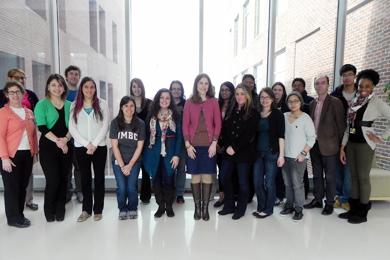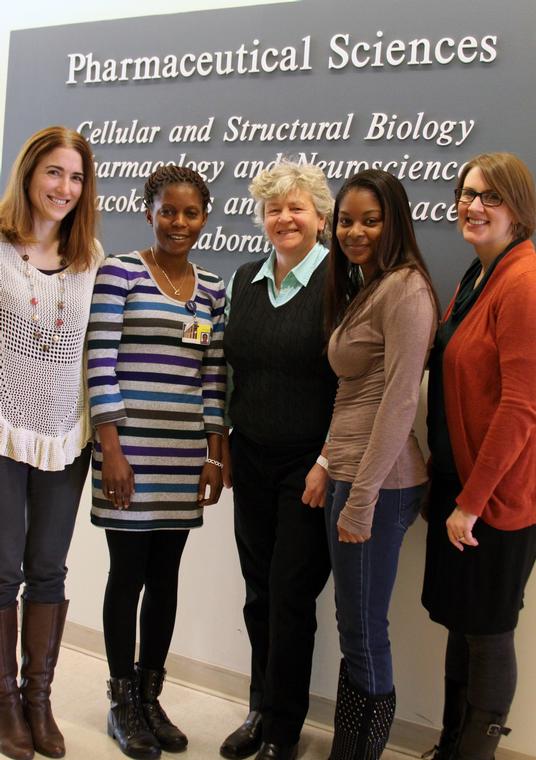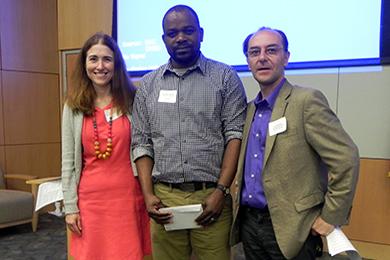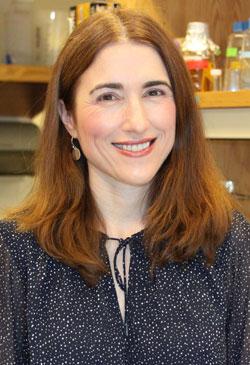SOP Helps Undergraduate Students “Spring Into Maryland Science”
Day-long workshop introduces science majors to the School’s Pharmaceutical Sciences Graduate Program.

By Malissa Carroll
March 26, 2013
Nine biology and chemistry majors from the Women’s College at Notre Dame of Maryland University gained a first-hand look at the wide range of research and career opportunities currently available in the Department of Pharmaceutical Sciences at the University of Maryland School of Pharmacy during a visit to the School on March 15.
Part of the School’s “Spring Into Maryland Science” (SIMSI) program, this day-long workshop was organized by Sarah Michel, PhD, associate professor of pharmaceutical sciences (PSC) at the School of Pharmacy, and Angela Sherman, PhD, associate professor of chemistry at Notre Dame. It is part of the educational component of Michel’s National Science Foundation CAREER Award, a five-year, $570,000 grant she received for her research on iron substitution and oxidative damage in Zinc Finger Proteins.
“The goal of SIMSI is to provide undergraduate science majors a ‘taste’ of the cutting-edge and interdisciplinary research that is conducted in PSC,” says Michel. “Often, undergraduates do not have a real sense of what doctoral research involves, and by offering them a day to immerse themselves in research, we hope to spark their interest.”
Now in its fourth year, the SIMSI program provides skills to strengthen undergraduate students’ academic performance, mentors and role models for the undergraduates in current pharmaceutical sciences graduate students, and innovative teaching opportunities for pharmaceutical sciences graduate students. It also stimulates teaching and research collaborations between faculty at Notre Dame and the School of Pharmacy.
“Currently, there are four students in the Pharmaceutical Sciences Graduate Program at the School of Pharmacy who received their undergraduate degrees from Notre Dame,” says Sherman. “I think that speaks really well about the connection between our students and this program. I appreciate having the opportunity to continue providing our students with opportunities like this that open their eyes to the many options available to individuals with doctoral degrees.”
The workshop began with an official welcome to the Notre Dame students. Andrew Coop, PhD, professor and chair of PSC, introduced students to the graduate program and spoke about the benefits of pursuing a doctoral degree.
“The goal of the PSC Graduate Program is to train students like you to become independent scientists. We train our students to critically think through a problem, develop a hypothesis, and design experiments to test that hypothesis,” said Coop. “Coursework complements our truly mentor-driven program, with the goal of our students becoming independent thinkers.”
Coop also addressed the different career opportunities available to individuals with doctoral degrees in pharmaceutical sciences, telling students that not only could they pursue careers in research at universities around the world, but they could also find careers outside academia, including careers in industry, as well as in a number of government agencies, such as the Food and Drug Administration and the National Institute of Standards and Technology.
Following the introduction, students broke into small groups and spent the remainder of the day shadowing current PSC graduate students in their labs.
“I was a little reluctant to come at first, because I did not know what to expect,” confessed Hershey Kaur, a sophomore and biology major from Notre Dame. “I was not expecting to have the opportunity to see the graduate students work in the lab, and, after that experience, I can say that I am glad I decided to participate in this workshop.”
“I was pleasantly surprised that we followed the graduate students around in their labs,” continued Candace Wright, a freshman and biology major from Notre Dame. “For someone like me, who has always been interested in research, this experience has really helped me get some ideas about what I might want to do later in my career.”
Graduate students also benefitted from participating as mentors in the workshop, having the opportunity to discuss their research, as well as explain the opportunities that the program has afforded them during their time at the School.
“This workshop offers a great experience to undergraduates and allows them to see what life for a pharmaceutical sciences graduate student is really like,” says Angelique Besold, a fourth-year graduate student in Michel’s lab and Notre Dame alumnus. “As an undergraduate, all of your experiments are planned for you. You know what to expect. That isn’t nearly as exciting as having the opportunity to do your own work, figure out problems, and answer questions that nobody has ever answered before.”
“I enjoy interacting with the students and explaining the great diversity in our department and what makes our program so unique,” continues Brandy Garzel, another Notre Dame alumnus and second-year graduate student who currently works in the lab of Hongbing Wang, PhD, associate professor of pharmaceutical sciences at the School of Pharmacy. “It’s great to have the opportunity to figure out what the students are interested in and be able to talk to them about how our department can help them. It also benefits the students because they can make connections with people in the program and have someone that they can talk to if they have any questions in the future.”
The workshop also serves as a recruitment tool for the 10-week internship program available through the PSC Graduate Program. This competitive internship program, which first launched approximately seven years ago, is open to any undergraduate student who has an interest in pharmaceutical sciences.



